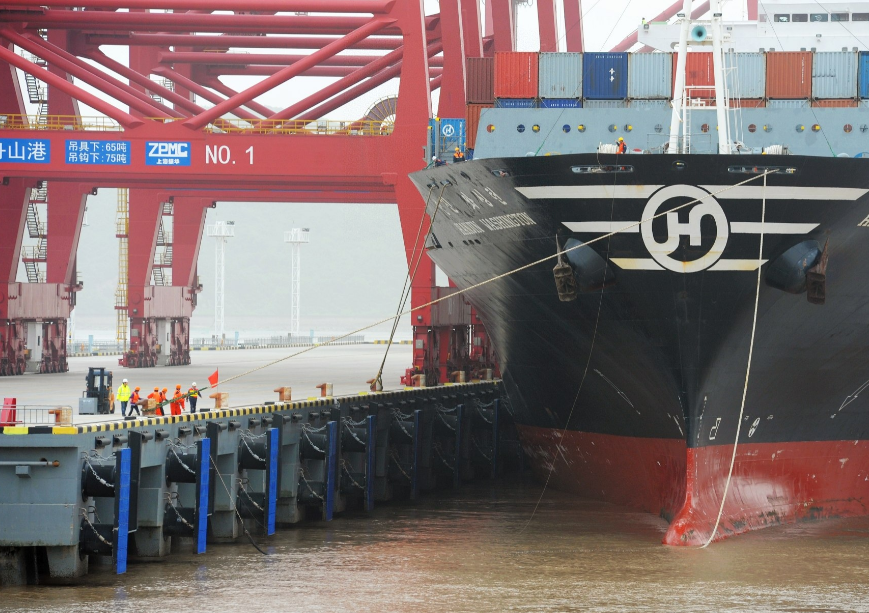HANGZHOU, June 7 (Xinhua) -- The Yangtze River Delta region, China's foreign trade hub, is fostering new growth drivers to boost the development of the sector.
With the COVID-19 pandemic still raging, the global economy has shown signs of economic recovery. The recovering demand of foreign markets has promoted the growth of China's foreign trade.
In the first quarter of this year, the delta region, home to the provinces of Zhejiang, Jiangsu and Anhui as well as Shanghai Municipality and accounting for over 30 percent of the country's total exports, saw double-digit growth in foreign trade.
Analysts attributed the stellar growth to factors such as the stable international supply chain, the upgrading of the foreign trade structure, the active private economy, and the sound scientific and technological innovation environment.
In the first quarter of this year, China's small commodity hub Yiwu in Zhejiang Province handled 513 Europe-bound freight trains, loaded with 42,874 TEUs of cargo, marking a year-on-year increase of over 370 percent.
"Railway transport has become a vital link in the international logistics supply chain," said Lin Huihuan, head of a freight forwarder of China-Europe freight train services.
For small and medium-sized foreign trade companies, the transcontinental trade routes have ensured the stability and smoothness of the international supply chain, and enabled them to deliver goods to customers quickly and punctually, added Lin.
The trade structure of foreign trade companies in the Yangtze River Delta region has been continuously optimized in recent years. In the first quarter of this year, Shanghai's import and export volume of high-tech products and mechanical and electrical products increased by 7.4 percent and 13.2 percent year on year, respectively.
During the same period, Zhejiang's exports of mechanical and electrical products and high-tech products rose by 49.3 percent and 60.8 percent year on year, respectively.
"Last year, we developed a new air suspension shock absorber, which has entered the European and U.S. markets. The overseas market is expected to expand further," said Jiang Mulin, general manager of an auto parts manufacturing company in Zhejiang.
The delta region has a solid technological foundation. As labor and other production costs are gradually increasing, the region's economic structure is upgrading and transferring to technology-intensive industries, said Xi Junyang, with Shanghai University of Finance and Economics.
"Therefore, the exports of foreign trade companies in the region tend to be technology-intensive products with high added value," added Xi.
As China accelerates the building of its new development paradigm featuring "dual circulation," in which domestic and overseas markets reinforce each other, with the domestic market as the mainstay, foreign trade companies in the region are turning their eyes to the domestic market.
In the past, domestically produced cars were equipped with manually adjusted seats. With the upgrading of consumption, China-made cars are now equipped with electric seats. "Hence, we are increasing our production capacity of electric seats to meet the demand of the domestic market," said Zhang Weixing, with an automobile electric appliance company in Anhui Province.
Rising commodity prices, exchange rate fluctuations, increasing labor costs and other factors are posing challenges to foreign trade enterprises in the delta region.
To help deal with these challenges, local governments have implemented a slew of favorable policies and measures, including simplified customs clearance procedures and more financial support, to help foreign trade companies expand domestic and overseas markets.
"The Yangtze River Delta region is making efforts to explore the emerging markets, while stepping up scientific and technological innovation to enhance the status of Chinese manufacturing in the global industrial chain," said Sheng Qiuping, director of the Zhejiang provincial department of commerce. Enditem




 A single purchase
A single purchase









